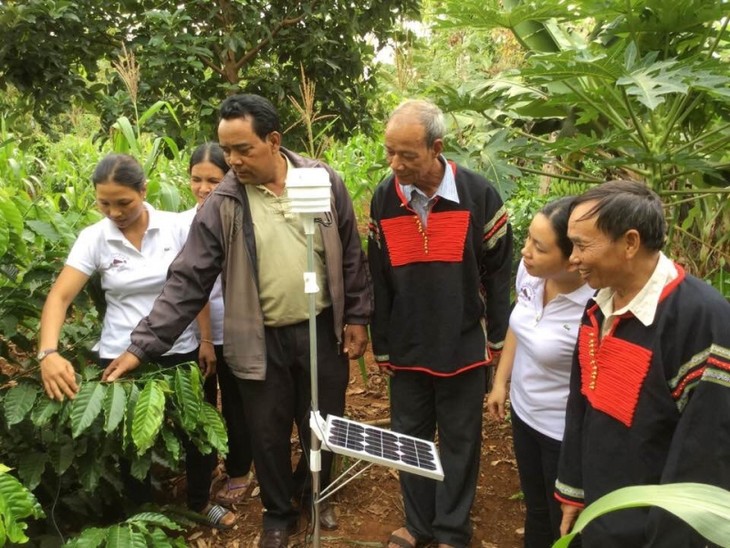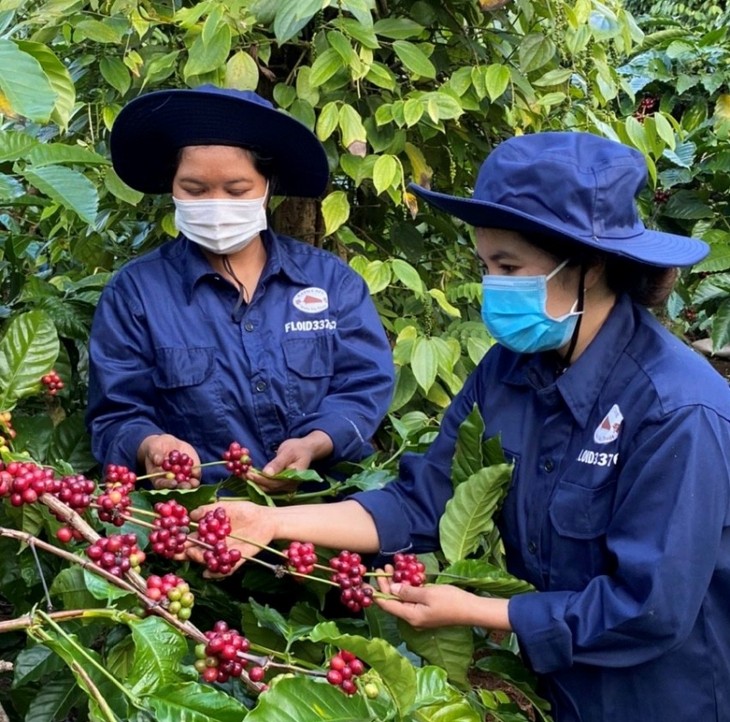(VOVWORLD) - The Central Highlands province of Dak Lak has vast agricultural land. In recent years the local ethnic minority people have applied scientific knowledge to agricultural production to improve productivity and incomes.
 Y Drin Nie's coffee farm has a drip irrigation system. (photo: VOV) Y Drin Nie's coffee farm has a drip irrigation system. (photo: VOV) |
Y Drin Nie installed a drip irrigation system at his coffee farm in Ea Tu commune, Buon Ma Thuot city 5 years ago. Since then coffee productivity and profits have increased. He can build a larger house, bought vehicles, and household utensils, and can afford to send his children to school.
Y Drin Nie said: “The drip irrigation system saves labor, electricity, and fertilizer, and increases productivity. The coffee trees flower evenly and the coffee beans are bountiful and bigger. Output has increased from 4 tonnes to over 4.5 tonnes. The system also gives me more time to do other work.”
H’Moan Êban in Ea Tu commune grows coffee and pepper on a 1.5 hectare farm. Her family had used old growing methods that weren’t productive until 2015 when she attended a training course on techniques to grow coffee, pepper, durian, and avocado. After the training course, they uprooted unproductive pepper trees, took out bank loans to grow new coffee varieties and durian trees, applied advanced farming methods such as Sponsored irrigation system, and used manure and biological products.
H'Moan Êban said that all coffee, pepper, and durian have grown well with stable yield: “This year I harvested 2.5 tons of coffee to earn 3,400 USD, more than 1 ton of pepper to earn nearly 3,000 USD, and 6 tons of durian to earn 13,000 USD.”
 A coffee farm in Ea Tu commune, Buon Me Thuot city (photo: VOV) A coffee farm in Ea Tu commune, Buon Me Thuot city (photo: VOV) |
Ea Tu is a purely agricultural suburban commune in Buon Ma Thuot City, with two thirds of the population being ethnic people.
Nguyen Quang An, Chairman of the communal Farmers' Association, said the local authorities have organized training courses with other sectors to help farmers access new techniques and improve productivity.
“Currently Ea Tu commune is implementing many advanced coffee models in combination with environmental protection. The Farmers' Association has applied drip irrigation and 360-degree rotational sprinkler irrigation. We also encourage farmers to produce organic fertilizers by composting coffee husks and by-products,” Mr. An said.
Huynh Thi Thu Phuong, a representative from Dak Lak province’s Center for Agricultural Extension, said that farmers have learned and applied science and technology to production, bringing agricultural revenue to account for 65% of the province's economy.
“We’ll offer support for farmers through different platforms, including our web-portal, leaflets, and communication channels of the local authorities. We’ll organize training courses for agricultural extension officials, who will transfer science and technology to the farmers, as well as farmers’ organizations and cooperatives. Agricultural extension officials will offer hands-on instruction to help ethnic people change their old practices,” said Phuong.
Nearly 36% of Dak Lak province’s population are of ethnic groups. Helping them change their farming habits and apply science and technology contributes greatly to poverty reduction and mass production.